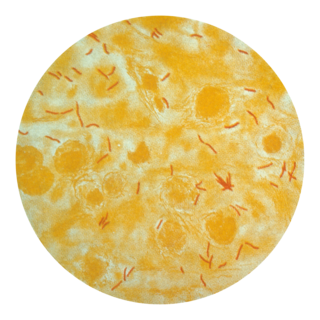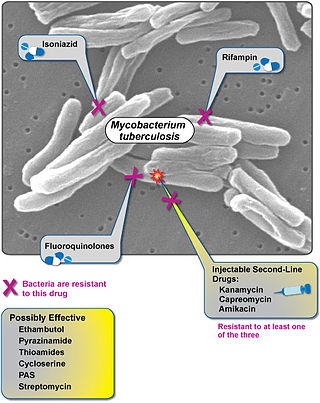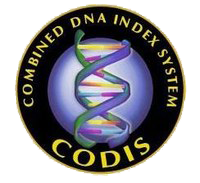Related Research Articles
DNA paternity testing is the use of DNA profiles to determine whether an individual is the biological parent of another individual. Paternity testing can be especially important when the rights and duties of the father are in issue and a child's paternity is in doubt. Tests can also determine the likelihood of someone being a biological grandparent. Though genetic testing is the most reliable standard, older methods also exist, including ABO blood group typing, analysis of various other proteins and enzymes, or using human leukocyte antigen antigens. The current techniques for paternity testing are using polymerase chain reaction (PCR) and restriction fragment length polymorphism (RFLP). Paternity testing can now also be performed while the woman is still pregnant from a blood draw.

AABB is an international, not-for-profit organization representing individuals and institutions involved in the field of transfusion medicine and biotherapies.

Tuberculosis is diagnosed by finding Mycobacterium tuberculosis bacteria in a clinical specimen taken from the patient. While other investigations may strongly suggest tuberculosis as the diagnosis, they cannot confirm it.
This is a list of AIDS-related topics, many of which were originally taken from the public domain U.S. Department of Health Glossary of HIV/AIDS-Related Terms, 4th Edition.

QIAGEN N.V., the global corporate headquarter of the QIAGEN group, is located in Venlo, The Netherlands. Furthermore, European, American, and Asian regional headquarters are located in respectively Hilden, Germany, Maryland United States, and Shanghai, China. QIAGEN is a provider of sample and assay technologies for molecular diagnostics, applied testing, academic and pharmaceutical research. The company operates in more than 35 offices in over 25 countries. QIAGEN's shares are listed at the NYSE and at the Frankfurt Stock Exchange in the Prime Standard. Thierry Bernard is the company's Chief Executive Officer(CEO). The main operative headquarters are located in Hilden, Germany.
Genotyping is the process of determining differences in the genetic make-up (genotype) of an individual by examining the individual's DNA sequence using biological assays and comparing it to another individual's sequence or a reference sequence. It reveals the alleles an individual has inherited from their parents. Traditionally genotyping is the use of DNA sequences to define biological populations by use of molecular tools. It does not usually involve defining the genes of an individual.

The Health Sciences Authority (HSA) is a statutory board under the Ministry of Health of the Government of Singapore. It is a multi-disciplinary agency, responsible for applying medical, pharmaceutical and scientific expertise to protect and advance public health and safety.
Orchid Cellmark Ltd is a UK based DNA and forensic testing company with a history of UK and US ownership.

Xenotropic murine leukemia virus–related virus (XMRV) is a retrovirus which was first described in 2006 as an apparently novel human pathogen found in tissue samples from men with prostate cancer. Initial reports erroneously linked the virus to prostate cancer and later to chronic fatigue syndrome (CFS), leading to considerable interest in the scientific and patient communities, investigation of XMRV as a potential cause of multiple medical conditions, and public-health concerns about the safety of the donated blood supply.

Extensively drug-resistant tuberculosis (XDR-TB) is a form of tuberculosis caused by bacteria that are resistant to some of the most effective anti-TB drugs. XDR-TB strains have arisen after the mismanagement of individuals with multidrug-resistant TB (MDR-TB).
The National Tuberculosis Elimination Program (NTEP) is the Public Health initiative of the Government of India that organizes its anti-Tuberculosis efforts. It functions as a flagship component of the National Health Mission (NHM) and provides technical and managerial leadership to anti-tuberculosis activities in the country. As per the National Strategic Plan 2017–25, the program has a vision of achieving a "TB free India",with a strategies under the broad themes of "Prevent, Detect,Treat and Build pillars for universal coverage and social protection". The program provides, various free of cost, quality tuberculosis diagnosis and treatment services across the country through the government health system.
Interferon-gamma release assays (IGRAs) are diagnostic tools for latent tuberculosis infection (LTBI). They are surrogate markers of Mycobacterium tuberculosis infection and indicate a cellular immune response to M. tuberculosis if the latter is present.
The South African National Accreditation System (SANAS) is the official accreditation body for South Africa. Founded in 1996, SANAS is headquartered in Pretoria, South Africa. SANAS accreditation certificates are a formal recognition by the Government of South Africa that an organisation is competent to perform specific tasks.
The Xpert MTB/RIF is a cartridge-based nucleic acid amplification test (NAAT) for simultaneous rapid tuberculosis diagnosis and rapid antibiotic sensitivity test. It is an automated diagnostic test that can identify Mycobacterium tuberculosis (MTB) DNA and resistance to rifampicin (RIF). It was co-developed by the laboratory of Professor David Alland at the University of Medicine and Dentistry of New Jersey (UMDNJ), Cepheid Inc. and Foundation for Innovative New Diagnostics, with additional financial support from the US National Institutes of Health (NIH).

Cerilliant Corporation, located in Round Rock, Texas, is a manufacturer of certified reference standards and certified reference materials providing products and services to forensic / toxicology, diagnostic/clinical, environmental, natural products, and pharmaceutical industries. Cerilliant is accredited to ISO Guide 34 & ISO/IEC 17025 and certified to ISO 13485 and ISO 9001:2008.
In paternity testing, Paternity Index (PI) is a calculated value generated for a single genetic marker or locus and is associated with the statistical strength or weight of that locus in favor of or against parentage given the phenotypes of the tested participants and the inheritance scenario. Phenotype typically refers to physical characteristics such as body plan, color, behavior, etc. in organisms. However, the term used in the area of DNA paternity testing refers to what is observed directly in the laboratory. Laboratories involved in parentage testing and other fields of human identity employ genetic testing panels that contain a battery of loci each of which is selected due to extensive allelic variations within and between populations. These genetic variations are not assumed to bestow physical and/or behavioral attributes to the person carrying the allelic arrangement(s) and therefore are not subject to selective pressure and follow Hardy Weinberg inheritance patterns.

The Combined DNA Index System (CODIS) is the United States national DNA database created and maintained by the Federal Bureau of Investigation. CODIS consists of three levels of information; Local DNA Index Systems (LDIS) where DNA profiles originate, State DNA Index Systems (SDIS) which allows for laboratories within states to share information, and the National DNA Index System (NDIS) which allows states to compare DNA information with one another.
Rapid DNA describes the fully automated process of developing a CODIS Core STR profile or other STR profile from a reference sample buccal swab. The “swab in – profile out” process consists of automated extraction, amplification, separation, detection and allele calling without human intervention. A machine designed to perform such rapid DNA analysis is called a DNA "magic box" by enforcement authorities.

Molecular diagnostics is a collection of techniques used to analyze biological markers in the genome and proteome, and how their cells express their genes as proteins, applying molecular biology to medical testing. In medicine the technique is used to diagnose and monitor disease, detect risk, and decide which therapies will work best for individual patients, and in agricultural biosecurity similarly to monitor crop- and livestock disease, estimate risk, and decide what quarantine measures must be taken.
The Punjab Forensic Science Agency is a government agency under the Home Department, of the provincial Government of Punjab of Pakistan. It provides forensic science services primarily to law enforcement in the province. The Punjab Forensic Science Agency act was passed by the Punjab Assembly on 4 October 2007; assented to by the Governor of Punjab on 29 October 2007; and, was published in the Punjab Gazette (Extraordinary), dated 30 October 2007.
References
- ↑ AABB Accredited Relationship Testing Facilities "http://www.aabb.org/Content/Accreditation/Parentage_Testing_Accreditation_Program/AABB_Accredited_Parentage_Testing_Laboratories/aboutptlabs.htm Archived 2010-01-31 at the Wayback Machine "
- ↑ INS Memorandum on DNA Testing to Establish Family Relationships “http://www.immigrationlinks.com/news/news413.htm”%5B%5D
- ↑ ASCLD/Lab "http://www.ascld-lab.org/international/indexinternational.html"
- ↑ CDC Tuberculosis Testing and Diagnosis https://www.cdc.gov/tb/topic/testing/default.htm
- ↑ Wang JY, Chou CH, Lee LN, Hsu HL, Jan IS, Hsueh PR, et al. (April 2007). "Diagnosis of tuberculosis by an enzyme-linked immunospot assay for interferon-γ". Emerg Infect Dis. 13 (4). doi:10.3201/eid1304.051195. PMC 2725949 . https://www.cdc.gov/EID/content/13/4/553.htm
- ↑ Vnencak‐Jones C L (July 2009). "Bone Marrow Engraftment Studies". Curr. Protoc. Hum. Genet. (UNIT 9.17). doi:10.1002/0471142905.hg0917s62. http://www.currentprotocols.com/protocol/hg0917 Archived 2009-06-20 at the Wayback Machine